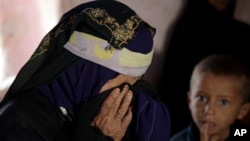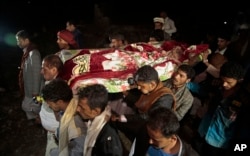U.S. Secretary of State John Kerry has agreed on a plan to restart peace talks in Yemen with Gulf Arab States and the United Nations, he told reporters in the Saudi city of Jeddah Thursday.
"This war needs to end and it needs to end as quickly as possible," he said after meeting with regional leaders, a British minister and the U.N. envoy to Yemen.
He said participants in the talks "agreed on a renewed approach to negotiations," and that Yemen's dominant Houthi group must cease fighting across the border with Saudi Arabia and work to form a unity government with its domestic foes.
The United Nations’ human rights chief Thursday called for an independent international investigation of abuses in Yemen that include military attacks on residential areas and medical facilities.
In a statement, U.N. rights chief Zeid Ra'ad Al Hussein said Yemeni civilians “have suffered unbearably over the years” because of armed conflicts.
And, he said, “... they continue to suffer, absent any form of accountability and justice, while those responsible for the violations and abuses against them enjoy impunity. Such a manifestly, protractedly unjust situation must no longer be tolerated by the international community.”
UN Rights Report
A report mandated by the U.N. Human Rights Council and released by the U.N. Human Rights Office Thursday details a number of allegations of human rights abuses committed in Yemen over the past 18 months that have led to thousands of deaths and left millions of people without proper food.
The report shows examples of military attacks on marketplaces and medical facilities, sniper attacks on civilians and the use of cluster bombs that could possibly be in violation of international law.
“In numerous situations where military targets could be identified, there remain serious concerns as to whether the incidental loss of civilian life, injury to civilians and damage to civilian objects that could be expected from the attack were not excessive in relation to the anticipated concrete and direct military advantage apparently sought,” the report said.
The United Nations estimates nearly 3,800 Yemeni civilians have been killed and more than 6,700 wounded since March 2015. That is when the Saudi Arabian coalition, which supports the government, began its bombing campaign against the Houthi rebels.
The report says the escalating fighting is taking a devastating toll on the civilian population. It reports 7.6 million people, including 3 million women and children, are suffering from malnutrition and at least 3 million people have been forced to flee their homes.
The chief of the Middle East and North Africa section of the High Commissioner’s Office, Mohammad Ali Alnsour, tells VOA all sides in the conflict are involved in serious violations and abuses.
“There was targeting of civilian objects protected by the international law like markets, like wedding ceremonies, hospitals, facilities that really under the international humanitarian law, is protected and have special kind of protection, legal protection,” Alnsour said.
The report documents several attacks in which no military objective could be identified. In numerous situations where military targets could be identified, it says the minimal gains from these attacks cannot justify the serious loss of life and injury to civilians and civilian infrastructure.
High Commissioner Zeid says the perpetuation of the conflict and its consequences on the population in Yemen can no longer be tolerated by the international community.
He is calling for an end to the impunity enjoyed by those responsible for the violations and abuses against the civilians. He says those found guilty must be held accountable.





